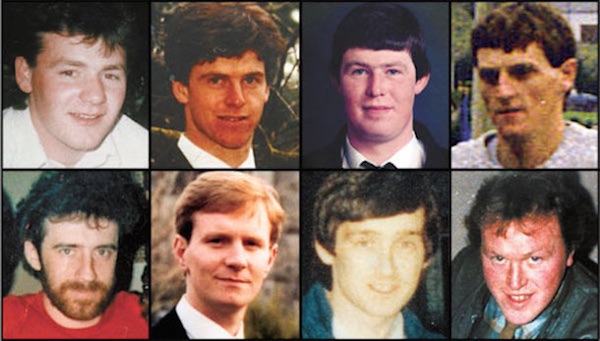
By Lasair Dhearg
This week marks the 32nd anniversary of the Loughgall Martyrs, eight volunteers of the Irish Republican Army who died in a gun battle commenced by ambush by British occupation forces in the village of Loughgall, Armagh.
The IRA’s East Tyrone Brigade was active mainly in eastern County Tyrone and neighbouring parts of County Armagh. By the mid-1980s it had become one of the IRA’s most effective and professional Active Service Units. Members of the unit, such as Jim Lynagh and Pádraig McKearney, advocated a strategy of destroying bases and preventing them being rebuilt or repaired, thus “denying ground” to forces of the occupation.
In 1985, Patrick Joseph Kelly became its commander and began implementing the strategy. In the subsequent years it carried out two major attacks on RUC bases often described as “spectaculars”.
The first was an attack on the RUC barracks in Ballygawley on 7 December 1985, in which two RUC personnel were executed. The second was an attack on an RUC base at The Birches on 11 August 1986. In both attacks, the bases were raked with heavy gunfire and then wiped out with a bomb. In the attack at The Birches, they had breached the base’s perimeter fence with a digger that had a bomb in its bucket. The operation being a huge success, they planned to use the same tactic in an attack on the lightly-manned Loughgall base.
The IRA’s attack involved two teams. One team would drive a digger with a bomb in its bucket through the base’s perimeter fence and set it to detonate. At the same time, the other team would arrive in a van and lay down heavy fire on the base, with the goal of wiping out the base and any occupation forces inside.
Both teams would then disengage and leave the area in the van. To avoid security checkpoints, the bomb was ferried by boat across Lough Neagh, from Ardboe to Maghery. The van and digger that would be used were hijacked in the hours leading up to the attack. The van, a blue Toyota HiAce, was stolen by masked men from a business in Dungannon. The digger was taken from a farm at Lislasly Road, about two miles west of Loughgall. Two IRA members stayed at the farm to stop the owners raising the alarm. IRA Volunteer Declan Arthurs drove the digger, while two others drove ahead of him in a scout car. The rest of the unit travelled in the van from another location, presumably also with a scout car.
The IRA unit arrived in Loughgall from the northeast shortly after 7PM. All were heavily armed, carrying H&K G3 rifles, one FN FAL rifle, two FN FNC rifles, a Franchi SPAS-12T shotgun and a Ruger Security-Six revolver. Wearing bulletproof vests, boilersuits, gloves and balaclavas, the digger drove past the police station, turned and drove back again with the Toyota van doing the same, ostensibly to check if the coast was clear. Members of the unit felt that something was amiss, and debated whether to continue, but decided to go ahead with the attack. Tony Gormley and Gerard O’Callaghan got out of the van and joined Declan Arthurs on the digger, supposedly “literally riding shotgun”, with weapons in one hand and a lighter in the other.
At about 7:15, Declan Arthurs drove the digger towards the base. In the front bucket was 200–400 lb of semtex inside an oil drum, partially hidden by rubble and wired to two 40-second fuses. The rest of the unit followed in the van with Eugene Kelly driving, unit commander Patrick Kelly in the passenger seat whilst in the rear were Jim Lynagh, Pádraig McKearney, and Seamus Donnelly. The digger crashed through the fence and the fuses were lit. The van stopped a short distance ahead and the team jumped out and began laying down fire on the building. At the same time, the bomb detonated, destroying the digger along with much of the building, and injuring three members of the occupation forces.
Within seconds, the SAS returned fire from hidden ambush positions in and around the station. 600 spent cartridge cases from the SAS were recovered with approximately 125 bullet holes in the bodywork of the van. The IRA Active Service Unit returned fire, commencing a heavy gun battle.
The eight IRA Volunteers were killed in the hail of gunfire; all had multiple wounds and were shot in the head. Declan Arthurs was shot in a laneway opposite Loughgall Football Club premises unarmed without a firearm in his vicinity except for a cigarette lighter close to his right hand. A number of the wounded IRA members were shot dead as they lay on the ground after the gun battle. The IRA members in the scout cars escaped.
Two civilians travelling in a car were also shot by the SAS. The two brothers, Anthony and Oliver Hughes, were driving home in a white Citroen. About 130 yards from the base, SAS members opened fire on them from behind, killing Anthony and badly wounding Oliver. The Citroen had approximately 34 bullet holes.
The villagers had not been told of the British operation and no attempt had been made to evacuate anyone, or to seal off the ambush zone, as this might have alerted the IRA.
The Loughgall Martyrs were gallant and brave heroes, who did not shirk from their responsibilites when it came to opposing the occupation. We remember them with pride.
![[Irish Republican News]](https://republican-news.org/graphics/title_gifs/rn.gif)
![[Irish Republican News]](https://republican-news.org/graphics/title_gifs/harp.gif)

